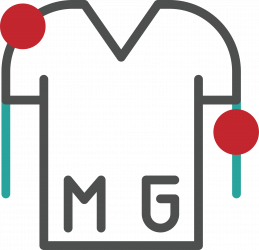A shoulder or humerus fracture is a break in the upper arm bone (humerus) or in the bones of the shoulder joint. This type of injury can occur due to trauma, falls, sports injuries, or medical conditions that weaken the bones.
Causes of Shoulder / Humerus Fractures:
The causes of shoulder or humerus fractures can include:
- Trauma, such as a fall or car accident
- Sports injuries, such as those that occur in contact sports
- Medical conditions that weaken the bones, such as osteoporosis
- Repetitive overhead activities that cause stress on the bones, such as pitching a baseball
Symptoms of Shoulder / Humerus Fractures:
The symptoms of shoulder or humerus fractures can include:
- Pain in the upper arm or shoulder area
- Swelling and tenderness around the injury site
- Bruising or discoloration
- Deformity or a visibly misaligned arm
- Limited range of motion in the shoulder or elbow joint
- Numbness or tingling in the arm or hand
Diagnosis of Shoulder / Humerus Fractures:
I can diagnose shoulder or humerus fractures through a physical exam and imaging tests such as X-rays, CT scan or MRI. During a physical exam, I will check for tenderness, range of motion, and any visible swelling or deformity in the arm. Imaging tests can confirm the diagnosis and determine the extent of the fracture.
Treatment of Shoulder / Humerus Fractures:
Treatment for shoulder or humerus fractures depends on the severity of the fracture. Mild fractures may be treated with rest, immobilisation, and pain medication. More severe fractures may require a combination of treatments, such as:
- Immobilisation: the use of a sling or cast to keep the arm stable while it heals
- Physical therapy: exercises to help maintain range of motion and strength in the arm and shoulder joint
- Surgery: if other treatments do not provide relief, surgery may be necessary to repair or remove damaged tissue or bone fragments.
Recovery from Shoulder / Humerus Fractures:
Recovery from shoulder or humerus fractures depends on the severity of the fracture and the type of treatment received. Most patients are able to manage their symptoms and return to their normal activities with appropriate treatment. Physical therapy can help to improve range of motion and strengthen the arm and shoulder joint. Surgery may require a longer recovery period.
In conclusion, shoulder or humerus fractures are a common type of injury that can cause pain, swelling, and limited mobility in the upper arm and shoulder area. If you suspect you have a shoulder or humerus fracture, it is important to seek medical attention promptly to receive an accurate diagnosis and appropriate treatment. With proper treatment and rehabilitation, most people are able to manage their symptoms and maintain their arm function.
